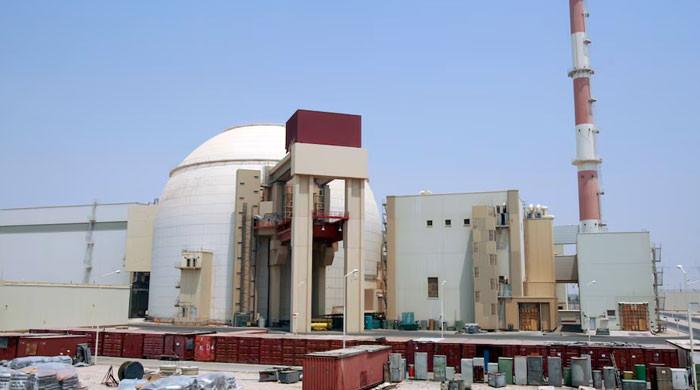Iran ‘Not Far’ From Nuclear Bomb, UN Watchdog Warns
- Denial of nuclear weapons to int’l community not enough.
- We need to be able to verify,” says IAEA chief Rafael Grossi.
- Official stresses cooperation at time diplomacy needed urgently.
TEHRAN: Rafael Grossi, the head of the United Nations nuclear watchdog, issued a warning on Wednesday, stating that Iran was “not far” from being able to create a nuclear bomb. This statement was made just before his arrival in Tehran for discussions.
Western nations, including the United States, have long asserted that Iran is attempting to develop nuclear weapons. However, Tehran has consistently refuted these claims, maintaining that its nuclear program is intended for peaceful civilian applications.
“It’s comparable to a puzzle. They possess the pieces, and at some point, they could potentially assemble them,” Grossi stated in an interview with the French newspaper *Le Monde* published on Wednesday.
“There’s still some distance to cover before they reach that point. However, it must be acknowledged that they are not far off,” he added.
The UN watchdog is responsible for monitoring Iran’s nuclear program and ensuring its compliance with the 2015 nuclear agreement. This agreement fell apart three years later when the United States, under President Donald Trump, withdrew from it during his first term.
“It is insufficient for the international community to simply be told, ‘We do not possess nuclear weapons,’ for them to believe you. We need to have the capability to verify,” stated Grossi, the director-general of the International Atomic Energy Agency (IAEA).
He arrived in Tehran on Wednesday and held a meeting with Foreign Minister Abbas Araghchi. He is also scheduled to meet with Mohammad Eslami, the head of Iran’s nuclear energy agency.
Grossi described his discussion with Araghchi as “important.”
“Cooperation with the IAEA is essential to provide reliable assurances regarding the peaceful nature of Iran’s nuclear program at a time when diplomacy is urgently needed,” he stated on X.
Grossi’s visit precedes a second round of negotiations between Iran and the United States on Saturday, one week after the two countries conducted their highest-level discussions since Trump abandoned the nuclear agreement in 2018.
Both parties characterized the initial meeting as “constructive.”
Contradictions
Earlier, Araghchi asserted that Iran’s uranium enrichment activities under its nuclear program were “non-negotiable” after US Middle East envoy Steve Witkoff called for them to cease.
“Iran’s enrichment is a real and accepted matter,” he told reporters.
“We are prepared to build confidence in response to potential concerns, but the issue of enrichment is not up for negotiation.”
His remarks followed Witkoff’s statement on Tuesday that Iran must “stop and eliminate” uranium enrichment as part of any nuclear agreement.
The day before, Witkoff had only urged Iran to return to the 3.67% enrichment limit established by its 2015 agreement with major powers.
The IAEA stated in its most recent report that Iran possessed an estimated 274.8kg (605 pounds) of uranium enriched to a level of up to 60%.
While this level greatly exceeds the limit set by the 2015 agreement, it remains below the 90% threshold required for a nuclear warhead.
After returning to office in January, Trump reimposed extensive sanctions against Iran under his “maximum pressure” policy.
In March, he sent a letter to Iran’s Supreme Leader Ayatollah Ali Khamenei, urging discussions but also cautioning about potential military action if these discussions failed to produce an agreement.
Ahead of Saturday’s new round of talks, Araghchi condemned what he described as the Trump administration’s “contradictory and conflicting positions.”
“We will ascertain the true opinions of the Americans during the negotiation session,” he stated.
Araghchi stated that he hoped to begin negotiations on the framework of a potential agreement, but that this would require “constructive positions” from the United States.
“If we continue to hear contradictory and conflicting positions, we are going to encounter problems,” he cautioned.
Red lines
On Wednesday, Iranian state media reported that Saturday’s discussions would take place in Rome with Omani mediation, which an Italian spokesman also confirmed.
However, US and Iranian officials have not formally confirmed the location.
Araghchi is scheduled to travel to Russia, an ally of Iran, on Thursday, according to Tehran’s ambassador in Moscow, Kazem Jalili.
Iran has stated that the visit was “pre-planned” but will include discussions on the Iran-US talks.
“The purpose of my trip to Russia is to deliver a written message from the Supreme Leader” to President Vladimir Putin, Araghchi explained.
In preparation for the US talks, Iran has engaged with Russia and China, both of which were parties to the 2015 agreement.
Prior to Saturday’s talks, Iranian President Masoud Pezeshkian expressed his hope that an agreement could be reached with the United States, according to the official IRNA news agency.
On Tuesday, Khamenei cautioned that while the talks had progressed well in their initial stages, they could still prove unproductive.
“The negotiations may or may not produce results,” he stated, noting that Iran had already defined its “red lines.”
Iran’s Revolutionary Guards have stated that the country’s military capabilities are not subject to discussion in the talks.
And late on Sunday, IRNA reported that Iran’s regional influence and its missile capabilities — both of which are sources of concern for the West — were also among its “red lines.”



Comments (0)
No comments yet. Be the first to comment!
Leave a Comment